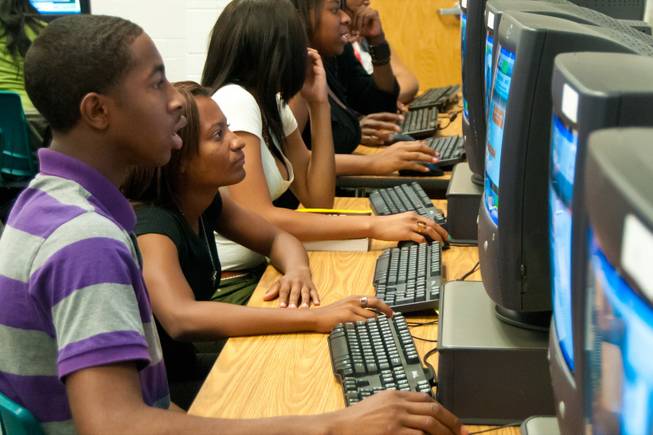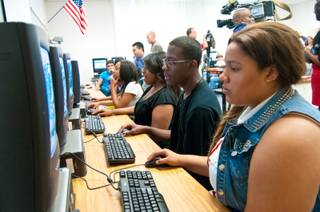
Mojave High School seniors Darryl Gorden (L) and Korizza Thomas (R) answer critical financial questions on a web-based program aimed towards helping them make better financial decisions, Wednesday May 30, 2012.
Thursday, May 31, 2012 | 2 a.m.
Sun coverage
In the aftermath of the Great Recession, policymakers across the country have turned their attention toward teaching youngsters about personal finance.
It’s not enough to teach reading and math, social studies and science, lawmakers said. Students need to understand how to avoid the very pitfalls that have trapped so many Americans with underwater mortgages and on the unemployment line.
More than 20 states now have laws on the books that require public schools to teach financial concepts relevant to the stock market, mortgages and credit card debt.
In 2009, Nevada adopted Senate Bill 317, which mandates that all school districts and charter schools incorporate financial literacy in the high school curriculum. Last month, the Nevada State Treasurer’s Office launched a $10,000 pilot program that teaches the basics of personal finance to students in Clark and Washoe counties.
The Clark County School District was already one step ahead, however.
For the past 15 years, the district has worked with the nonprofit Junior Achievement of Southern Nevada, which has been teaching financial literacy skills at elementary schools across the valley. Volunteers, often from local businesses, visited classrooms for a few hours each year to lead financial skills workshops using Junior Achievement’s curriculum of workbooks and colorful flashcards.
However, the program focused predominantly on elementary schoolchildren. Nevada’s financial education law specifically targeted high school students.
That’s why Clark County Schools Superintendent Dwight Jones launched a unique pilot program earlier this school year that uses an online virtual game to teach dry financial terms to students at 12 local high schools.
The “$mart Program” — developed by Washington, D.C.-based EverFi — is the second largest of its kind in the nation, said Jon Cirome, EverFi’s director of western operations. EverFi’s financial literacy game is being used in more than 3,500 schools across the nation, serving more than 4 million students.
“Financial education is not the most fun thing for students to learn,” Cirome said. “We’re taking an innovative approach to teaching financial literacy. We want to make it fun and engaging.”
The computer game brings students into virtual environments such as the New York Stock Exchange or the local car dealership to teach students about the stock market and how to read a car lease contract. Students can learn at their own pace, going through more than 600 financial concepts in banking, housing and investing.
After each lesson, students can learn how to file a sample W-4 tax return or a Free Application for Federal Student Aid. They can also play a virtual “SimCity”-like game that tests their knowledge of credit cards, credit scores and consumer fraud.
“It’s exciting that kids are finding this stuff fun,” Jones said,= after visiting the program at Mojave High School on Wednesday.
The “turnaround” school in North Las Vegas has seen the effects of the economic downturn firsthand. The city has been ground zero for the Great Recession, with the highest unemployment rate in a state that has the highest unemployment rate in the country. The neighborhoods surrounding Mojave have also been hit hard by the foreclosure crisis, said Principal Antonio Rael.
“These are survival skills,” Rael said of financial literacy. “We get so focused on academics — which is paramount — but it’s also important to give students these real-life skills.”
Mojave senior Darryl Gorden agreed.
“It’s a good program for teenagers trying to get a job or go to college,” the 17-year-old said.
After participating students posted an average 35 percent improvement between the pre- and post-tests on the “$mart Program,” the School District is contemplating scaling up the pilot program to all 49 high schools, Jones said. The program is already being used in several large urban school districts, such as Miami-Dade.
The pilot program in Las Vegas costs $25,000 and is sponsored by the United Way of Southern Nevada and CitiBank. A scaling up of the program will likely be funded through local business sponsorships, Jones said.
However, technology has its limitations, said Averill Kelley, a Mojave teacher who has used “$mart Program” in his senior government class.
Half of his students don’t have access to a computer at home, which makes it difficult for Kelley to assign financial literacy homework to his students, he said.
Still, students seem to have taken to the program, which uses familiar computer game technology to engage them, Kelley said.
“They found it really useful,” he said. “But financial literacy needs to come earlier than (in their) senior year.”
Mojave High School is Rattler Nation, but really it’s home to underdogs.
Minutes from the Nellis Air Force Base the school is nestled near Commerce Street and West Ann Road, an area littered with foreclosed homes.
The school is attended by many students who are underprivileged or at-risk. After Mojave failed to meet No Child Left Behind standards it became one of five Clark County Schools determined to do a 180.
In order to make the turnaround a reality, Mojave has implemented new faculty, extended the school day by 20 minutes and is geared towards boosting school spirit.
“The problem we have right now is that our children aren’t proud of their own school,” Mojave principal Antonio Rael explained an August interview. “When our children begin to take pride in our school, our community will follow.”
- Year built:
- 1997
- Mascot:
- Rattle Snake
- Principal (Year Hired):
- Antonio Rael (2001)
- School motto:
- “Promoting Achievement, Creating Success”
- Mission Statement:
- “The Mission of the Mojave High School Community is to provide a safe learning environment that will empower students to develop excellence, pride, respect, and skills necessary for future success.”
- Enrollment:
- Approximately 2,000
- School Report Card:
- 2010-2011
Compiled by Gregan Wingert


Join the Discussion:
Check this out for a full explanation of our conversion to the LiveFyre commenting system and instructions on how to sign up for an account.
Full comments policy